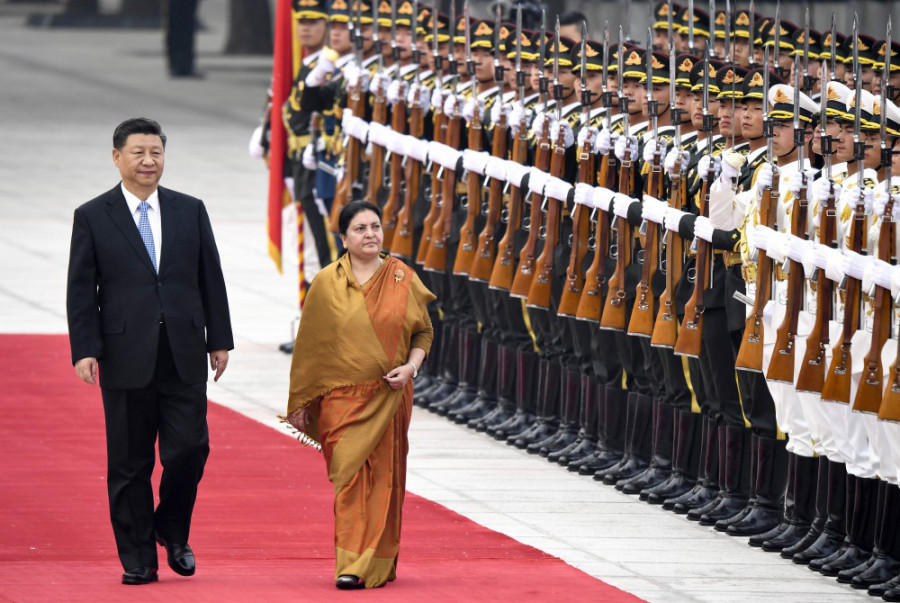Opinion
Good neighbours
Provided that Nepal can balance geo-political realities, BRI will aid in development.
Gao Liang
This past week, China hosted the President of Nepal, Bidhya Devi Bhandari, for the first time. This visit was highlighted by President Bhandari’s attendance of the second Belt and Road Forum for International Cooperation (BRF). More importantly, the Nepali President and the Chinese leadership will set the tone for further cooperation between China and Nepal under the framework of the Belt & Road Initiative (BRI). In order to build a better future together, the two countries need to sort out and summarise the course of the past few years.
By the end of March 2019, the Chinese government had signed 173 cooperation agreements with 125 countries and 29 international organisations. Two years ago, on the eve of the first forum, the number was only 40. From 2013 to 2018, the value of trade between China and other Belt and Road countries surpassed $6 trillion, accounting for 27.4 percent of China’s total trade in goods and growing faster than the country’s overall foreign trade. More than 100 customs inspection and quarantine cooperation documents have been signed with countries along the route. China has established the ‘Silk Road’ Chinese Government Scholarship and a series of scholarship programmes for students from these countries, and reached agreements with dozens of countries to exempt visas and simplify visa procedures, thus greatly improving the convenience of personnel exchanges.
BRI has become the main driving force for China’s economy to continue to move forward. At the same time, it also argued that it helps to fuel the rapid development of countries involved. The concept of consultation, contribution and shared benefits advocated by BRI is never an empty slogan. From 2013 to 2018, direct investment of Chinese enterprises in countries along the route of BRI exceeded $90 billion, with an average annual growth of 5.2 percent, creating large employment numbers.
Nepal and BRI
In March 2015, when attending the annual conference of the Boao Forum for Asia (BFA), the then President Ram Baran Yadav said that Nepal supports China’s initiatives of jointly build the BRI and the Asian Infrastructure Investment Bank. In March 2016, during Prime Minister KP Oli’s visit to China, the two countries reached on 10 agreements on transit trading, investment, infrastructure construction and other fields. In May 2017, Nepal signed the Memorandum of Understanding on the framework agreement with China on BRI, thus Nepal officially joined the BRI. In 2018, during the Foreign Minister Pradeep Gyawali and Prime Minister KP Oli’s
visit, Nepal and China further proposed the construction of a Trans Himalayan Multi-Dimensional Connectivity Network. A memorandum of understanding on cooperation in railway projects was signed. Later that year in September, the much-hyped protocol of Nepal-China Transit and Transportation Agreement (TTA) was finalised.
Nepal has undergone important changes in domestic politics in recent years; political leaders of different parties led the government at different times. Yet, it should be fair to point out that these changes and differences have not affected the trend of cooperation between China and Nepal under the framework of BRI. Such confidence comes not only from the long-standing friendship between the two countries, but also from the high recognition of their respective development concepts. No party can lead Nepal by ignoring the Nepali people’s desire to achieve national development and prosperity. Opening up, seeking foreign investment and international cooperation are the only ways to respond to this desire.
Similarly, China’s active promotion of its BRI cooperation with Nepal is also based on its confidence in its own development model. Over the past 40 years, the Chinese government has regarded opening up as the main engine driving economic growth. China’s development has benefited from globalisation, and in return has further promoted it. Based on this understanding, the Chinese believe that they have the ability to let other countries, including Nepal, to take the express train of China’s economic development. This is a great opportunity for Nepal, and China will also benefit from joint development, so as to realise the
concept of joint construction and sharing advocated by BRI.
Looking forward
There is no doubt that the leadership of China and Nepal is sincere and determined to promote bilateral cooperation. In fact, in the past few years, we have seen a lot of benefits in cooperation, which encourages us to continue to deepen it. Nevertheless, we should remain sober in recognising that some inherent and emerging challenges also need to be taken seriously. First of all, we should admit that the BRI is interpreted differently by people. False accusations of the project being a debt trap or Debt Imperialism not only hurts China, but also puts pressure and distress on the cooperating countries and their policymakers. China and Nepal must first achieve mutual trust in their respective strategic intentions, so that each knows what goals they want to achieve, especially through what means.
Secondly, Nepal’s investment environment also deserves attention. Nepali media and experts have long made an objective and in-depth analysis of this. Attracting investments is only the beginning. How to keep them and realise development and value-addition is the most important step. We have seen achievements, but
cannot ignore examples of failures and difficulties. It is not wise to blame one party for that, but both sides must take responsibility as partners in a pragmatic manner. China must make its investment more scientific and transparent to respond to doubts. Nepal has a big space to improve the friendliness of its investment environment.
Another unavoidable question for Nepal is how it will deal with the relationship between its independent development and the pressures posed by its unique geopolitical environment. This is a problem Nepal has been dealing with all along, and will have to deal with for a long time to come. We should not exaggerate the antagonism that sometimes accompanies geopolitics, but Nepal does need superb political wisdom to achieve balance. The constraints in this regard are also the need for both parties to take into account when making
decisions.
Liang is a doctoral student at Sichuan University, China.




 21.12°C Kathmandu
21.12°C Kathmandu










